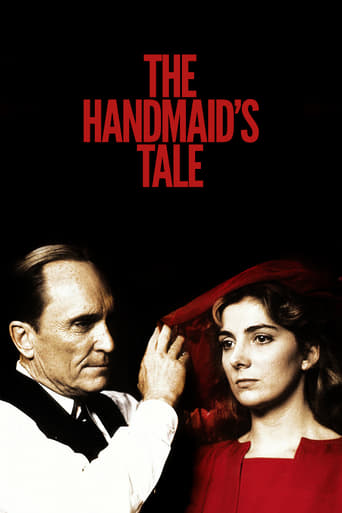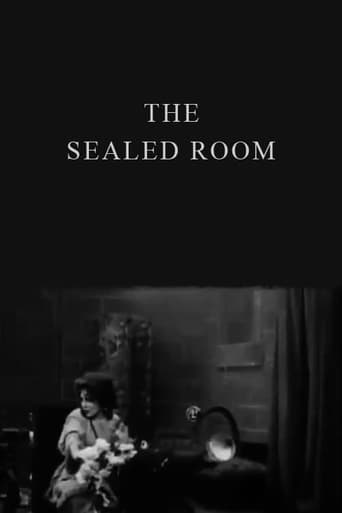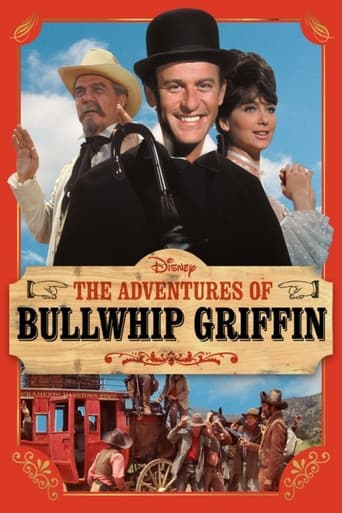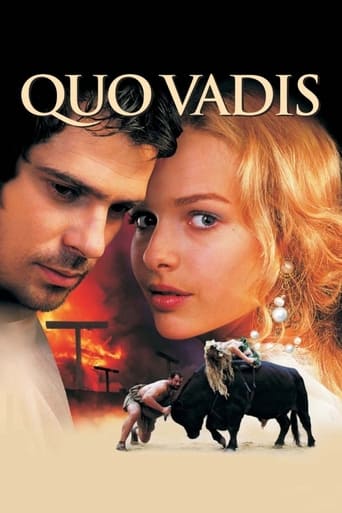

Quo Vadis (2001)
Ancient Rome, during the time of Emperor Nero. Vinicius, a young patrician, falls in love with the beautiful Lygia, the daughter of a Barbarian commander who was killed in battle, and wants her for his concubine. For Lygia, a Christian, being a pagan's concubine is a severe sin and disgrace. However, when Vinicius is wounded, Lygia cares for him, and starts to reciprocate his feelings. Vinicius, in return, becomes interested in Christian learning and asks Apostle Peter to teach him. In the meantime, Emperor Nero accuses Christians of having started a great fire in Rome. He encourages the imprisonment, torture and murder of his Christian subjects.
Watch Trailer
Cast
Similar titles
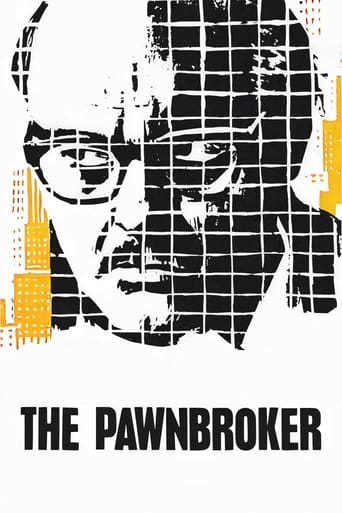

Reviews
Memorable, crazy movie
Pretty good movie overall. First half was nothing special but it got better as it went along.
A movie that not only functions as a solid scarefest but a razor-sharp satire.
what a terribly boring film. I'm sorry but this is absolutely not deserving of best picture and will be forgotten quickly. Entertaining and engaging cinema? No. Nothing performances with flat faces and mistaking silence for subtlety.
MGM Roman epic QUO VADIS? (1951) has remained one of the top movies among epic buffs. However, its popularity is not so much raised by its source novel but rather by its grandeur of colossal spectacle and magnificent performances. Therefore, after more than 50 years, the movie is still highly entertaining. But a thought may arise...the Noble Prize winning novel QUO VADIS? is not only a historical account of the Rome in Nero's cruel reign but, foremost, a truly insightful, human and thought provoking novel by a great Polish novelist Henryk Sienkiewicz, the novel that masterfully develops human struggles within the corrupted world ruled by an artist, a cynic, a debaucher, an arsonist, a "beast." That thought absorbed the late director, a Pole Jerzy Kawalerowicz, who, in 2000, took up a task to adapt QUO VADIS? for the screen again. As I have seen both the movie and the TV series, my comment will apply to both of them and will hopefully result in a detailed analysis.I would like to analyze this movie in two separate aspects: first, its depiction of historical period, its recreation of the first century Rome (epic features including wardrobe, sets, etc) and, second, its faithfulness to the novel.Kawalerowicz's vision of Rome turns out to be much weaker than LeRoy's in 1951 film. It is short of that lavishness, scenes of crowds, magnificent wardrobe and that tension of splendor. The Roman Empire appears to be "closed up" and laconic. Consider, for instance, the burning of Rome which is condensed, hardly shows the event realistically being a glimpse on the seemingly small group of people in panic. Nero does not sing playing his harp while viewing the burning city from his balcony but he sings on an aqueduct in the middle of a sunny day. The palace occurs to be deprived of that grandiosity we found at LeRoy's. These flaws go in pairs with some technical weaknesses. Let me mention, for instance, the famous bullfight where Lygia is tied naked to the bull but Ursus appears to keep control over the animal from the very beginning. The bull barely moves and people's reactions are fake. Therefore, the movie faced strong criticism and, indeed, if we consider QUO VADIS? in terms of its recreation of Rome only, it is a flawed epic.However... The movie is a very faithful adaptation of the novel and catches the gist of what Sienkiewicz wanted to convey. First, this has to do with the characters. The director develops Chilo Chilonides (Jerzy Trela) the character that was almost skipped in the American version. The story of this man who is once ironically called "the king of the state of wickedness" is so psychological that the entire movie about him would suffice for a meaningful story. His character indeed makes one find forgiveness meaningful and conscience universal. Chilo is beautifully portrayed by Jerzy Trela in a magnificent performance. In Nero's court, we have an accurate insight into "Nero's evil spirit" Tigellinus (Krzysztof Majchrzak) who prompts most crimes of the mad emperor. The depiction of Christian characters is also very accurate. What strikes us among Christians is the living example they give to the pagans and thanks to that example, they convert many people. In this respect, I would like to mention the arena scene - this movie really supplies the viewer with the gore of it, the camera goes in between the martyrs and you as an observer are really affected by the depiction. What touched me most is the baby consumed by a lion while the whole crowd is being mute to this tragedy as if it were totally unnoticed. The movie also depicts the arbiter of elegance, Petronius (Boguslaw Linda), as a witness of dying Christians (in accordance with the novel). That is what I like most about 2001 QUO VADIS? It makes use of the themes developed in the novel.As far as the performances are concerned, there is a great acting and a poor acting. The leading cast Pawel Delag as Marcus Vinicius and Malgorzata Mielcarz as Lygia are good though Delag sometimes leaves much to be desired. He, unlike Robert Taylor, does not clearly portray his character's glorious way from the triumph of conquest to the triumph of spirit. He appears to be very sympathetic from the beginning, no proud Roman leader at first and a devoted believer later. Michal Bajor is not very good as Nero but it is not the looks that make his performance flawed but his talk. I liked Boguslaw Linda's portrayal of Petronius and Krzysztof Majchrzak's Tigellinus. Except for the aforementioned Trela, Franciszek Pieczka does a fine job as Apostle Peter, a calm hearted fisherman of Galilee who once left his barge and gave his total self to the Lord.Finally, I would like to add one more feature of the film: its ability to talk to viewers' hearts. Unlike many epics that draw our attention rather to the spectacle, this movie gives us an insight into particular moment of the human history at the dawn of the new faith. It seems to ask a viewer a question of importance: What is it to be a person? Is it possible that one human feasts and laughs watching lustfully the other one dying in horrific pain? Is the world really mute to the moving cry of a little baby consumed by the beast of hatred, political correctness or indifference? "Quo Vadis Domine?" "Whither Goest Thou, Lord?" Peter asked Christ on the way. He heard the answer "To Rome, to be crucified the second time" The memorable question that appears at the end of the movie seems to be the question of many people of our times: "Where are you going, Lord?" people who subtly predict the answer in their hearts: "To the innocent who constantly suffer most"
This new Polish version of a Polish novel, written in the 1890's by Henryk Sienkiewicz (who won the Nobel prize), is an excellent movie, gripping, exciting and deeply moving. Unlike the 1951 MGM version, which was a costume epic typical for its time, this new film seems to be about real people caught in the maelstrom that was Nero's Rome, in the struggle between decadent paganism and the emerging new faith of the Christians. The book is a favorite of mine and the screenplay's fidelity to the novel is highly commendable. The actors are vivid in their portrayals. This Nero, for instance, seems like a real madman, not a fine actor hamming it up (as did Ustinov in the 1951 film). The Petronius is excellent, the two leads both young and handsome. The conversion of Vinicius and Chilon are convincing and moving. This nearly-three-hour film moves quickly and covers a lot of ground. The ending gave me pause, and it's a stunner. The movie deserves a much wider audience than it's going to get in the US, because, face it, most people who go see foreign language films are not the same people who go to see religious, historical epics. I hope it gets a video release, at least. Hollywood would have given this film costlier and better special effects - the burning of Rome is a bit anemic - but Hollywood could not have filmed this movie as honestly, truthfully and brilliantly.
Jerzy Kawalerowicz's Quo Vadis was both a compelling and evocative production. The story, based on love amidst persecution is a timeless story that was portrayed effectively thanks to the fantastic directing by Mr Kawalerowicz, the breathtaking special effects and the exceptional acting by some of Poland great actors. Although the film was 3 hours long, at no time was I bored or even afterwards, the film left me thinking about those times and the various themes conveyed in the film. This film is truely an epic and deserves to be credited as such.
A film which many were looking forward to. Not surprisingly as it is the most expensive film in the history of the Polish film industry ($18 million). Unfortunately, it doesn't pay off. One wonders where all the money went. I watched the film with two friends, one an actor who is a good friend of many of the actors in the film. After ten minutes, he was shaking his head, stating with unbelief at the terrible acting of the lead player Pawel Delag (Vinicjusz). We wanted to like the film, but we felt we were watching a TV play and the film was only saved in moments by the formidable acting of Boguslaw Linda and Jerzsy Trela. I must, however, applaud the excellent lion scene in the arena. With this I don't have qualms - excellent effects - this only saves five minutes of an over long boring 180 minutes. Oh, and one more thing, at times I felt I was watching a soft porn movie - what a shame!! That fact in itself was a big "turn-off", and they have school children watching this. Very sad.





